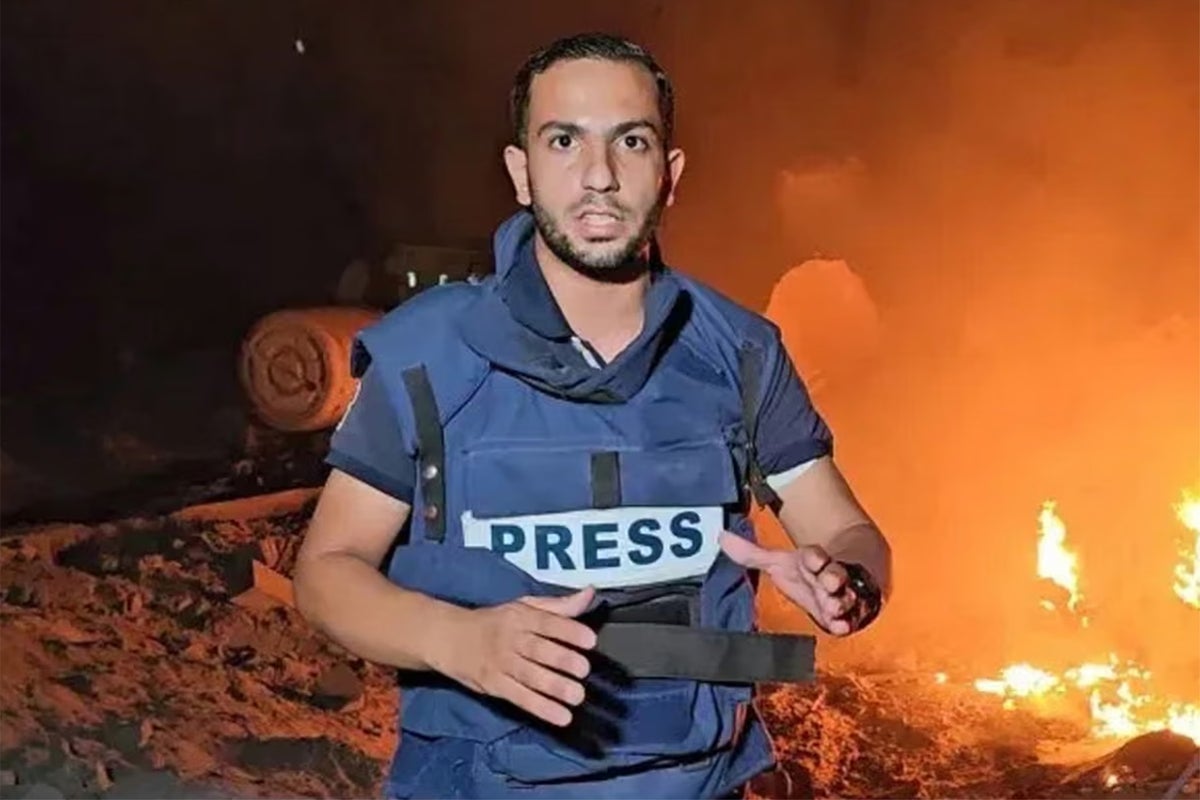Hundreds of journalists have reportedly been killed in Gaza since the war began on October 7, 2023, making it one of the most deadly conflicts ever for the profession.
The latest figures from the UN say that at least 242 Palestinian journalists have died in the nearly two-year conflict. The death toll has continued to mount in recent months as Israel’s attacks in the war-torn enclave have escalated. On Sunday six journalists, including prominent Al Jazeera correspondent Anas Al Sharif, were killed in an airstrike sparking widespread international condemnation.
The Committee to Protect Journalists (CPJ) says Gaza has the highest number of journalist deaths since the organisation started gathering data in 1992 and in April, Brown University’s Watson Institute declared the war was “quite simply, the worst ever conflict for reporters”.
Al Sharif, 28, was targeted and killed after being accused of leading a Hamas cell and involved in rocket attacks against Israel by the military, claims denied by Al Jazeera. The news agency called the 28-year-old “one of Gaza’s bravest journalists”. They condemned the attack as a “desperate attempt to silence voices in anticipation of the occupation of Gaza.”
Mohammed Qreiqeh, Ibrahim Zaher and Mohammed Noufal were named as the other journalists killed in the strike on a tent near Al Shifa Hospital, east of Gaza City, according to Gaza officials and Al Jazeera. On Monday a sixth journalist, Mohammad Al-Khaidi, was reported to have died from the same attack.
The Israeli Defence Force posted a statement on X where they claimed that Al-Sharif was a “Hamas terrorist” posing as an Al Jazeera journalist.
“Al-Sharif was the head of a Hamas terrorist cell and advanced rocket attacks on Israeli civilians and IDF troops,” the statement said. “Intelligence and documents from Gaza, including rosters, terrorist training lists and salary records, prove he was a Hamas operative integrated into Al Jazeera. A press badge isn’t a shield for terrorism.”
Israel has previously denied targeting journalists and said it does everything it can to avoid harming civilians.
Human rights organisations and news agencies have condemned Israel as the number of journalists killed in Gaza since the war began has steadily increased.
In a statement criticising the latest deaths, UN Human Rights said: “We condemn the killing by Israeli military of 6 Palestinian journalists by targeting their tent, in grave breach of international humanitarian law. #Israel must respect & protect all civilians, including journalists.
“At least 242 Palestinian journalists were killed in Gaza since 7 Oct 2023. We call for immediate, safe & unhindered access to Gaza for all journalists.”
CPJ regional director Sara Qudah said: “Israel’s pattern of labeling journalists as militants without providing credible evidence raises serious questions about its intent and respect for press freedom.
“Journalists are civilians and must never be targeted. Those responsible for these killings must be held accountable.”
Early on in the war, Belgian-Palestinian cameraman Samer Abu Daqqa was killed in an Israeli missile strike on a school that also injured Al Jazeera bureau chief Wael Al-Dahdouh on 15 December 2023.
Al-Dahdouh’s son, journalist Hamza al-Dahdouh, was killed by an airstrike on their vehicle less than a month later on 7 January 2023. The CPJ would later brand Hamza Al-Dahdouh’s death a murder.
Abu Daqqa’s death was submitted to the International Criminal Court as a complaint against Israel over the killing of seven Palestinian journalists.
Ismail Al-Ghoul, another Al Jazeera correspondent, died on 31 July 2024 in an Israeli airstrike targeting the Al-Shati refugee camp.
The IDF accused Al-Ghoul of taking part in the October 7 attack, which was again disputed by Al Jazeera.
Dismissing the claims, a spokesperson for the news outlet said at the time: “The network condemns the accusations against its correspondent Ismail Al-Ghoul, without providing any proof, documentation or video.”
Foreign journalists have been blocked from entering the war-torn strip, which Freedom To Report has denounced as “not just a humanitarian blackout, it is an information blackout that undermines the public’s right to know and journalism’s democratic function to hold power accountable.”
As criticism mounts, Israel has said it it looking at allowing foreign media into Gaza to verify activities in the war-torn Strip.
“I’ve ordered, directed the military to bring in foreign journalists, more foreign journalists – a lot,” Benjamin Netanyahu said in the Times of Israel, adding the order went out two days previously and was subject to security considerations to ensure journalist safety.
BBC News joined Agence France-Presse (AFP), Associated Press (AP) and Reuters in releasing a statement condemning the starvation of journalists in the strip at the end of July.
The full statement read: “We are desperately concerned for our journalists in Gaza, who are increasingly unable to feed themselves and their families.
“For many months, these independent journalists have been the world’s eyes and ears on the ground in Gaza. They are now facing the same dire circumstances as those they are covering,” the news organisations said, adding: “Journalists endure many deprivations and hardships in warzones. We are deeply alarmed that the threat of starvation is now one of them.
“We once again urge the Israeli authorities to allow journalists in and out of Gaza. It is essential that adequate food supplies reach the people there.”

